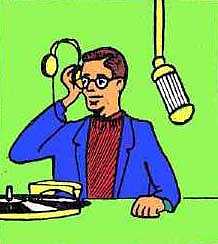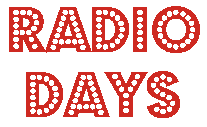|
At the end of my sophomore year I returned to the rusting steel plant to
work for the summer, this time assigned to industrial engineering, where I and
a handful of other part-timers with company connections took time studies of
the various machines deep within the cavernous mill. In many ways it was
exhilarating, walking at dawn between the two enormous blast furnaces that
generated so much heat it was necessary to cover the sides of one's face to
avoid scorched cheeks. Smelling the oil and grease and armed with a stopwatch
and a clipboard, I stood on the sawdust and timed the yield of the cumbersome
machines that fabricated assorted lengths and widths of pipe. The steelworkers,
with a bemused hostility, watched us sweating under our metal safety helmets
as we counted the cylinders that rolled from the machines onto conveyor belts.
Midway through the summer, the workers went on strike, shutting down the mill.
I was certain the company would let the temporary hands go, but they kept us
on, and most days we played Ping-Pong in the company rec room while the
strikers ringed the plant with picket signs and six-packs. When the summer and
the strike ended I emerged the winner of the department's baseball pool.
Back in Athens as a junior, I moved to a room which I shared with a
disaffected fraternity brother -- a music major from Niles, Ohio, named Attilio
"Sam" Core -- in a private home at 28 Montrose Street whose backyard
abutted the Theta Chi house, a fraternity that was not our own. We'd heard that
Theta Chi was a rough fraternity composed predominately of men from Cleveland,
at the time a pejorative description.
 James (Doc) Tuverson James (Doc) Tuverson
1959 |
Theta Chi's kitchen steward was James
"Doc" Tuverson, Jr., of Dayton, who hosted a music show on WOUB
called "Prescription: Music." Often, when I awoke in the morning, I'd
find breakfast on my dresser, coffee and juice and Danish. Doc would cross the
backyard from his kitchen and leave the food in my room, a casual act of
magnanimity that still touches me. Doc, tall and movie star handsome, possessed
a degree of maturity that I lacked, and in many ways he helped me to temper
some of my post-adolescent abrasiveness that so frequently alienated my peers.
I was best man at Doc's wedding in Charleston, West Virginia, where he was working at WKAZ, sister station to WSAZ in Huntington, where I was an air man [a broadcast term]. He was later hired as the producer of a well-known television talk show, Bob Kennedy's "Contact," which was aired by Westinghouse out of WBZ in Boston, and, years later toward the end of his broadcast career, was program director of KGO in San Francisco. Doc and I drove to Columbus one weekend, while we were still in college, to inspect the 50,000-watt FM
station operated by Ohio State University. Despite OSU's gargantuan size, we
knew that, when it came to broadcasting or journalism, our David was superior
to their Goliath. We were impressed by the Columbus facilities, however, and
the young man on duty in the control room patiently -- and with half-lidded
eyes -- explained that, "Unlike student-run stations such as yours, ours is a
professional operation, maintained by full-time professional staff members,
like myself." He hit a remote button to launch a tape, and over the
loudspeaker was heard a jumble of incomprehensible words. "My God,"
the young professional screamed, "I cued the tape up backward!" This is just one of the reasons that Ohio U grads take umbrage when their older and more historic institution is mistaken, as it often is, with the loathed and profoundly inferior Ohio State. Size is not all.
NOTE: Jim Tuverson died of cancer in Los Angeles on February 8, 2005. He was sixty-seven.
| |
 Tuverson: later and before
Tuverson: later and before
| |
Studying in my room on Montrose Street, I heard a far off
rumble, a strange, menacing sound. It was spring, and exuberant male students had taken to the streets, encouraged by the coeds who
threw bras and panties from the upper windows of their dorms. As
WOUB's Special Events Director I sprang into action, although recording
equipment in the fifties had not been miniaturized enough to make it easily
portable. Even as the housemother at Scott Quad emerged from the hall with a
broom and began furiously swinging it at the mob of party-makers, the Athens
town cops took matters into their own hands, and lobbed tear gas at the
revelers. A cloud of stinging, acrid smoke erupted at my feet, and as I tried
to escape the fumes by sprinting down an alley alongside the Speech Building, I
was blocked by a ten foot wall which I knew I could never scale. With the
explosion of another tear gas canister behind me, however, I marshaled
the adrenaline to accomplish the feat and clawed my way over the wall to
safety. Perhaps the physical education classes we were forced to take had been
useful after all. Students poured from the dorms and fraternity houses to watch
the melee, and everyone was good natured about the fracas, immature as it was, but the local
constables. On Court Street, the red-neck men in blue bravely sped in their squad cars
to within inches of the curb forcing students to leap onto the sidewalks to
avoid death or injury. What were those small-town cops thinking?
The spring riot and similar later episodes severely
damaged the university's reputation, although the Eisenhower era disturbances
were more cheerful than angry. Many years later, after the massacre at Kent
State, OU was forced to temporarily close its doors because of student
hostility toward authority, any authority. University president Claude Sowle,
who served from 1969 to 1974, kept a large cardboard box full of rocks,
souvenirs, in his basement. Sowle told me many years later that they were the debris that student anti-war protesters tossed through the windows of his home, the president's residence, on Park Place.
T he summer following my junior year, healthy and my hearing near normal,
I was married in a church wedding in Florida to my high-school sweetheart. My
best man was David Lanphier, a theater major and fraternity brother from
Painesville, Ohio. A day before the wedding Dave and I went to the beach to
bake in the deceiving Florida sun. On the first night of the honeymoon, in a
sweltering St. Augustine motel room where the air conditioner had broken down,
my new bride rubbed my sunburned back and chest with Noxzema in an ineffectual
effort to relieve the pain. In Indiatlanic on Route A1A, where we stayed in an
un-airconditioned room over the real estate office owned by my wife's
stepfather, I fruitlessly pursued summer employment, applying at the local
radio stations in and near Melbourne. I had a bankroll of $100 and an
exaggerated sense of optimism.
One local station was in the rear of a music store, and when I approached the owner about a job, I was rejected with such hostility and rudeness that I left the premises almost in tears. "Ain't
nothing here for you, boy." Later, I heard from mutual acquaintances that
the owner, a right-wing bigot, had treated me badly because he mistakenly thought I was a
Jew. The man was quoted as saying, "If I'd known he weren't no Jew I might have had somethin' for him." Finally, I was offered a warehouse job at an aerospace firm in Cocoa Beach on the condition that I not resign at the end of summer, but since I intended to return to Athens my conscience
refused to let me accept the offer. Instead, I spent the summer painting a
house (incompetently), working as a typist, babysitting, and writing
fiction--and I returned to Athens with my $100 bankroll intact.
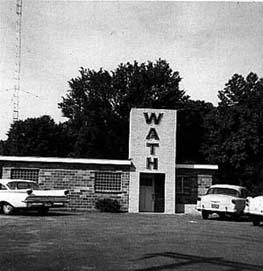
|
Back at OU for my final year, I learned that Andy Kovlan, owner of the
local daytime commercial station in Athens, WATH, actually paid certain
students to work for him part time at ninety-cents an hour, so I auditioned and
was hired to read the news in the morning, host an hour music show at noon,
then return in the late afternoon to operate the board until sign-off, which
was sundown. Because I had to operate the transmitter and fill out the
transmitter log as part of my duties I was required to apply for a
"Restricted Radiotelephone Operator Permit," which was issued on
October 17, 1958. On the back of the permit was the warning that "the use
of obscene, indecent, or profane language" was prohibited. The tiny staff
of WATH was billeted in a one-story brick building that squatted on a swampy
area out on the highway, the station's transmitter tower rising behind it.
WOUB's Lee Fowler, Martin Schmeltz (also known as Marty Howard), and George
Baggott also signed on as part-timers at WATH.
| |
George, who used to trade plugs on the air for haircuts, was also an amateur photographer. He lived on Court
Street, one floor above a popular student dive known as the Tavern, in a
thunderously noisy apartment. George decorated his living room with enlarged
black and white photos of his wife giving birth to their baby, gore and all, in
a hospital delivery room. Such photos aren't unusual now but were shocking at
the time. He was later killed in a motorcycle accident in McKeesport outside of
Pittsburgh, where he was working at a CBS radio affiliate.
|
WATH's most reviled show was called "The Obituary Column of the
Air." The latest deaths were phoned in by the local funeral homes which
reveled in the free publicity. Sonorously, I read the deaths verbatim over a
bed of lugubrious organ music. I also took a board shift on Sunday mornings during
which there was a succession of religious broadcasts hosted by free-lance
evangelists who spent their thirty minutes on the air begging for
contributions. Andy Kovlan made it clear that no rascally preacher was to take
the mike until he paid $25 in cash for his half hour -- the money up front. When
one unshaven, lantern-jawed preacher with missing and yellowed teeth balked at
paying he drawled, "Son, don't you want to help me do God's work?" I
answered, "Not without the twenty-five dollars in my hand." On some
weekends Andy would send me on remotes to a Chevrolet dealer on Route 33. With
an amplifier, a single turntable, and a microphone I'd spend the afternoon
playing hillbilly music and hawking used cars.
|
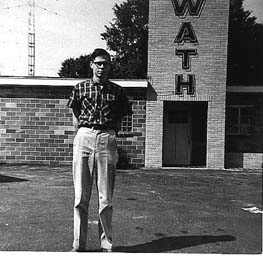 |
|
While WATH was not a first-rate station, perhaps not even second-rate, I was able to write and deliver my newscasts there and receive the same academic credit as if I had produced them
for WOUB. On January 1, 1959, I wrote, "The biggest story is found in
Cuba, where President Batista has left the country and enraged mobs are
demonstrating by smashing hotel casinos, breaking windows, and wrecking parking
meters. The rioting has broken out in the very heart of Havana."
Ted Kovert, the easygoing early morning man at WATH, was the only
full-time announcer at the station, so it was no surprise that he was paid more
than the rest of us. We knew how much everyone was paid because Andy Kovlan
would throw our paychecks face up on the counter in the lobby for anyone to
see. Even though Ted worked full-time I saw that he appeared to be compensated
wildly out of proportion to what I made, so I hitched up my belt and asked Andy
about the disparity. He said, "Hell, I pay Ted extra because he cleans the
station." As he spoke I saw Ted with a bucket mopping the floors. The day
before he had cut the grass and chopped the weeds outside. And I'd thought he
was just being conscientious. After his shift and his chores were finished Ted
would decamp to a tavern just up the highway. There, with his cronies, he drank
boilermakers, shots of whiskey followed by chasers of beer, until he weaved
home to sleep in the afternoon.
B y my senior year I was making $30 a week at WATH, plus another $16.75 a
month (which went quite far in those days) as Special Events Director of WOUB.
My assistant was Don Folger, who had been in my freshman class at Devilbiss
High School in Toledo. The difference between the station's Special Events
Director and the News Director was distinct. The news, which students rewrote
from the United Press International wire or the Athens Messenger, was virtually
static, delivered on the air with little or no attempt to embellish the product
with sound or actuality. Sound was what Special Events reveled in -- live
interviews, on the spot coverage of breaking stories, remotes from far-flung
locations, fund-raisers. I shamelessly pirated NBC's "Monitor," and
carried the concept to WOUB's own weekend with a two-day broadcast filled with
remotes, live and taped interviews, and music. Chi Rho Beta, the honorary radio
fraternity, gave "Weekend" its "award of merit for outstanding
achievement in programming at WOUB."
In addition to my duties at WOUB and WATH, every Saturday and Sunday I
drove to a 250-watt daytimer, WJEH in the Ohio River town of Gallipolis (for
City of the Gauls), to work a board shift that began at noon. The town's most
famous native son was O. O. (Oscar Odd) McIntyre, whose syndicated newspaper
column, "New York Day by Day," reached 104 million readers in the
1930s. The station's bland motto was "Serving the Ohio Valley Since June
1950." Even though my father was continuing the $20 a month allowance he'd
given me throughout my college career, I wanted to partially reimburse him for
my out-of-state tuition, which was higher than it would have been had my family
still lived in Ohio.
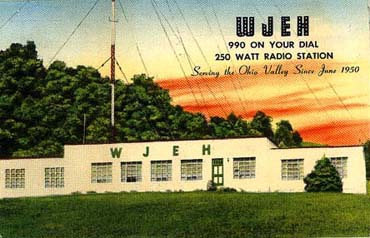 My wife, who worked part-time as a clerk at Logan's Book
Store, and I were living in a tiny, dilapidated apartment on North Congress
Street. The apartment was warmed by an unvented gas heater. One frigid morning,
as I used a match to try to light the heater, it exploded in my face. While my
face felt hot, I was more disturbed by the unfamiliar, bitter odor that filled
the room. When I looked into the bathroom mirror I saw that my eyebrows and the
hair in the front of my head were missing, burned to a crisp by the blast. It
was on the roof of that apartment building that I was stung on the forehead by
a bumblebee as I attempted to erect a television antenna (the only station that
came in with any clarity was Channel 3 in Huntington, West Virginia).
Immediately after the sting I became ill with chills and nausea which soon
passed. Years later, a documentary writer and novelist with whom I worked
at Channel 2 in Baltimore, George Gipe [author of Coney Island Quickstep and collaborator on such Steve Martin screenplays as Dead Men Don't Wear Plaid and The Man With Two Brains], was stung by a bee and went into
convulsions and died. At the time of my sting I had no notion of its
potentially fatal allergic effects.
My wife, who worked part-time as a clerk at Logan's Book
Store, and I were living in a tiny, dilapidated apartment on North Congress
Street. The apartment was warmed by an unvented gas heater. One frigid morning,
as I used a match to try to light the heater, it exploded in my face. While my
face felt hot, I was more disturbed by the unfamiliar, bitter odor that filled
the room. When I looked into the bathroom mirror I saw that my eyebrows and the
hair in the front of my head were missing, burned to a crisp by the blast. It
was on the roof of that apartment building that I was stung on the forehead by
a bumblebee as I attempted to erect a television antenna (the only station that
came in with any clarity was Channel 3 in Huntington, West Virginia).
Immediately after the sting I became ill with chills and nausea which soon
passed. Years later, a documentary writer and novelist with whom I worked
at Channel 2 in Baltimore, George Gipe [author of Coney Island Quickstep and collaborator on such Steve Martin screenplays as Dead Men Don't Wear Plaid and The Man With Two Brains], was stung by a bee and went into
convulsions and died. At the time of my sting I had no notion of its
potentially fatal allergic effects.
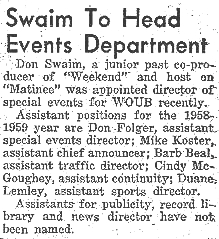 OU Post, May 1958 OU Post, May 1958 |
In the spring of my senior year, Stan Kenton and his orchestra arrived
by bus to perform at a prom at the student center. I appropriated a WOUB tape
recorder and interviewed Kenton in the ballroom after the dance. Following the
interview I walked with the bandleader to the sidewalk, and we saw that his bus
had pulled away and was lumbering down the street. "Hey, wait for
me!" Kenton screamed, running after the bus. Later, after I edited the
Kenton interview and aired it on WOUB and again on WATH, I was summoned to
appear before Vincent Jukes and was asked if I had used WOUB equipment to
interview the musician. I admitted the deed and was informed that I was guilty
of a gross conflict of interest by allowing the interview, made with WOUB
equipment, to be used on the commercial station. Jukes told me to make a
choice. WOUB or WATH. My protests that WOUB was not in competition with WATH,
that the interview was also heard on WOUB, and that as an impoverished married
student, with a pregnant wife, I desperately needed the money, fell on deaf
ears. Make a choice, I was told. So, with graduation a mere weeks away, I did
the only thing I could do. I resigned as Special Events Director, cursing the
injustice of it and forever recoiling at the word Jukes. The decision also
meant that my picture would not be among the WOUB officers in the annual
yearbook, the Athena.
| |
Our landlord told my wife and me that we could store any unwanted
furniture in the vacant apartment on the first floor, which we did. A couple of
days later an Athens town cop knocked at my door, arrested me for trespassing,
and escorted me to the police station where I had to post $25 bail. The
headline in the Athens Messenger, which was put on WOUB's bulletin board, read,
"Swaim Charged with Trespass." At trial, the former tenant of the
downstairs apartment confirmed that he had been evicted, but had a receipt
showing that he still had two days to go on his lease at the time we'd stored
our furniture in his empty room. The judge, who found me guilty but suspended
the $25 fine, put his arm around me as we stood on the sidewalk outside the
courthouse. "Son," he said, "it don't take much to get in trouble,
does it?" The headline, again pinned to the WOUB bulletin board, read,
"Swaim Found Guilty."
My nascent criminal career didn't end there. Two weeks later, while driving into Gallipolis for my stint at WJEH, a state cop arrested me for speeding and made me
follow him to the office of the local justice of the peace. "How do you
plead?" The magistrate asked me. "Guilty," the cop said,
speaking for me, thank you officer. I was fined $10, cash which I didn't have. The judge refused
to take a check until I phoned my boss at WJEH, Mary Ann Campbell, and she agreed
to make good the money, should my check bounce. The headline in the local paper
in Gallipolis read, "Student Admits Speeding."
WJEH was owned by a local business man, John E. Halliday (thus the call letters). The control room had but two turntables, making it impossible to do any kind of fancy production
work (even cartridge tapes were a couple of years away). For top-forty style
production you needed at least three turntables. When I pointed that out to
Holliday, he said, "What do you need three turntables for? You can only
play one record at a time." On weekends, before I began my board shift,
the station's black janitor conducted a raucous one-hour rhythm and blues show,
a style of music I'd never heard before and didn't understand. Since the
thirties the recording companies had branded it "race" music. I thought it was pretty bad at the time, but ultimately R&B changed everything.
A scholarly-appearing local Catholic priest delivered a live sermon on WJEH each Sunday. While he was on the air on morning, and I was on the board, instead of listening to his drivel, I was in the control room spinning pop 45s for my own ears. The sound must have drifted into the studio because suddenly I saw him banging the microphone on the table. Slam! Slam! Slam! As I cut his mike and scrambled to put on some music to fill, the moron came into the control and screamed, "When I deliver a sermon I expect you fuckers to listen." I thought this half-wit priest was going to get me fired, but he didn't.
Although I no longer had my paid supervisory post at WOUB, I continued
to work at the station in addition to my commercial jobs. George Davis, who
went to WOOD in Grand Rapids, Michigan, after graduation, produced an ambitious
live children's program called "The Uncle Mac Show," which included a
cast and real musicians. I played Uncle Mac, my voice pitched to that of a foxy
old man. Gifted piano player Arnie Rosenberg, who headed a trio called the Blue
Notes, wrote the show's theme, which he recorded and released commercially as a
45 RPM record. One afternoon I irresponsibly forgot to come in to do the
broadcast, and a furious George Davis wound up producing "The Uncle George
Show" that day. Sorry about that, George. If you're still around I hope you can forgive me.
|
Because I was on so many stations that busy year I sometimes used the name Don Lewis, applying my middle name. Once, a listener
called me to say he was driving through Gallipolis on the way back to Athens
and he listened to a feller on the air he swore could have been my brother.
When WOUB's new television studio [its first] was built, I was to deliver a commentary,
which I had to memorize, on camera. TelePrompTers had not been invented. After
CBS hired a blond Washington Post columnist, Sally Quinn, to anchor one of its
many ill-fated attempts to create a successful morning show to compete with
NBC's "Today," Sally turned to a technician in the studio, pointed at
the camera, and said, "What's that red light?" Unlike Quinn, I knew
exactly what the red light meant and froze at the sight of it. When the light
came on, no words came out and I looked blankly and in fear at the camera,
convinced I could never adapt to television the way I had to radio. The fear
proved to be unfounded, and later, partially overcoming my terror, I joined
WSAZ Radio and TV in Huntington, West Virginia, where I went on-camera -- even
filling in as weatherman, despite a total lack of knowledge of anything
meteorological. I was only a radio major, after all.
|
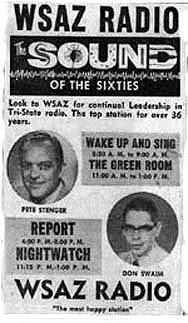 |
|
As graduation approached, those who passed before the microphones at
WOUB along with me in the fifties began to contemplate their futures. Frank
Youngwerth and "Jolly" Bill Miller, helped to launch a new station at
Middleport-Pomeroy, Ohio, WMPO. Miller died prematurely in an airplane
collision at the local airport. Will Kitchen, an announcer, agonized as to
whether he should pursue a broadcasting career or take a job with a clay
factory in Logan, Ohio. He took the factory job, and later operated a car
dealership in Columbus. Wilson Graham, a student station manager, stayed on
track and joined NBC News. Terry Leedum became the spokesman for the Citadel,
South Carolina's military college, at the height of the controversy over the
admission of women. Martin Schmeltz (Howard) worked at WFAS in White Plains,
New York. Doug Sinsel became the producer of NBC's "Today." Neil
Kuvin served as program director of WABC-TV in New York. Chuck Brinkman landed
a job as a dj at KQV, Pittsburgh. Joe Vaughn became a long-time news anchor at
one of the ABC Radio networks. Jon Black went to WABC Radio. Dave Wolford wound up in academia, teaching at the University of Pennsylvania's Wharton School. Michael Dickerson also took the academic route, and after a military career joined the faculty of George Mason University.
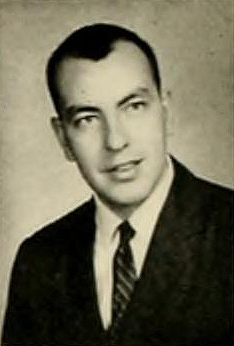 Roger Ailes as I knew him Roger Ailes as I knew him |
Roger Ailes, many pounds lighter and with a full head of hair, later discovered right-wing politics and produced the Rush Limbaugh TV show before heading the Fox News Channel.
Ailes was a freshman when I was a senior, and I recall him as an ambitious go-getter who, in his junior year, became WOUB's student station manager. In a way, his ultimate success as the chairman of Fox News led to his downfall. Forced to resign after female employees accused him of multiple sexual abuse, Ohio University rescinded Ailes's million-dollar gift establishing "The Roger Ailes Newsroom." He died after a fall in his home in 2017.
| |
Shortly before my graduation in June, 1959, Boz Johnson of the NBC radio
and television affiliate in Huntington, WSAZ, invited me to audition and hired
me for $75 a week. Archie Greer, my avuncular faculty adviser, urged me to hold
out for $90, but I concluded that, at the time of the so-called Eisenhower
recession, a $75 job was better than no job at all. I was to begin work at WSAZ
two weeks before commencement exercises (Boz was already dealing with vacation
replacements).
A day after our baby was born prematurely at a Catholic hospital in Nelsonville,
a small town north of Athens, I -- wearing a new blue straw hat -- joyously drove in
the 1954 Ford I'd bought from my father along the Ohio River to begin my new
job. I had everything. A hard-earned college degree, a job at a prestigious
station, a beautiful wife, a new baby, a new straw hat. While I was in West
Virginia, where I stayed with my wife's aunt and uncle, I learned that our
newborn had died after just two days. Word of the death came, when I phoned the
hospital from Huntington, from a matter-of-fact nurse who apparently didn't
know that I was the father. That night, through the tiny towns along the Ohio
River, I defied the lurking hillbilly cops as I sped back to Athens. It was the
same stretch of river that Davis Grubb described in his baleful novel, The
Night of the Hunter, in which a malignant preacher bears the letters l-o-v-e on
the knuckles of one hand and h-a-t-e on the knuckles of the other. My wife
wasn't at the hospital when I got there. The nurse told me she'd been driven
back to Athens, along with the baby, by her doctor. At the apartment on North
Congress Street, my wife was strangely distant and it was left to me to express
our grief for both of us. As we walked from our apartment to go to the cemetery
to bury the infant, Andy Kovlan, my former boss at WATH, passed by in his car
and rolled down the window. "Sorry to hear about it," he shouted.
 my mother, father, & me. June 1959 my mother, father, & me. June 1959 |
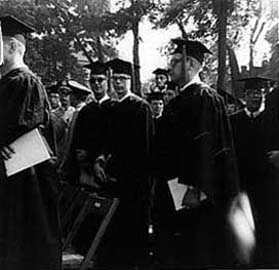 left to right: Jim Tuverson, Don Swaim, left to right: Jim Tuverson, Don Swaim,
Bill Miller. June 1959. | |
In that exhausting, bitter-sweet atmosphere I stood on the Green in my
cap and gown for commencement exercises at 2:00, Sunday, June 7th, 1959. The
speaker was Donald K. David, vice-chairman of the Board of the Ford Foundation,
whose remarks made no impression on me then or now. Despite my undistinguished
academic record I was proud to have completed four years at Ohio University,
and to stand, under a confident spring sky for black and white snapshots with
my mother and father on the Green, Memorial Auditorium as the backdrop. My
father put his hand on my shoulder and said, "You did it yourself, you
know." For him, that was the ultimate compliment. He was a businessman, a
staunch conservative, who viewed with undisguised skepticism, even a measure of contempt, what he thought was an erratic decision on my part to enter broadcast journalism. As a
graduation gift, he presented me with a check for $1,000, the face amount of an
insurance policy he'd taken out on my life shortly after my birth in Wichita,
Kansas, where he'd worked as a young man in the oil business. I'd never known about the policy.
Suddenly I was rich. Never had I had so much money to lose.
At WSAZ I conducted a primitive radio call-in show called "Open
Line" (which was abruptly canceled after callers managed to phone in
obscenities on the air -- we had no tape delay), and I recreated
"Weekend" to fill in the blocks of time when NBC's
"Monitor" wasn't on. Two WOUB alumni followed me to Huntington: Denny
Steadman and Dick Thompson--plus Doc Tuverson, who joined sister station WKAZ in
Charleston. Pink-slipped after two years at WSAZ, along with Fred Briggs [later of NBC-TV], for impudence on the air considered too intemperate for West Virginian sensibilities -- and my marriage
in shambles -- I headed east to work in stations in Pennsylvania and Delaware before joining the CBS
television affiliate in Baltimore, and then CBS in New York.

News Director, WORK, York, PA, 1963 -- with appalling crewcut. In the backround, reporter Tim O'Neil. Note the ancient typewriter and the police radios perched on the air conditioner. The ruler dangling above Tim's shoulder was used to rip copy from the A.P. teletype, which is baffled in that big wooden box. click to enlarge. |
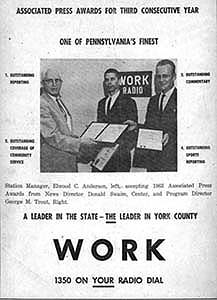 Don: winner of three 1963 Associated Press journalism awards, including Outstanding Reporting. click to enlarge. Don: winner of three 1963 Associated Press journalism awards, including Outstanding Reporting. click to enlarge. |

WMAR-TV, Channel 2, Sunpapers Television, CBS, Baltimore, 1966. I'm standing, second from the left. Behind the camera, 5th from the left, is Al Goldstein, another WOUB alum. Note the blazers with the CBS Channel 2 logo we had to wear. And those huge, clumsy film cameras. Still in my twenties, my title was Supervising News Editor. click to enlarge |
| |
Dick Thompson landed a
job in public relations for Pontiac. Twenty-five-years after our radio days in
Ohio he happened to hear me anchoring the news on WCBS in New York, and phoned
to offer me a new car, no strings attached, noting Pontiac's unselfish
generosity toward people in the media. I had to decline, citing the no-payola
pledge CBS made its employees sign, knowing that it would be the end of my
broadcast career should CBS discover that I'd accepted a freebie in the form of
an auto. But that was a long time ago, and were Dick Thompson still at Pontiac,
it should be understood that I no longer work at CBS, so Dick lay it on. Oh, wait. Didn't Pontiac go bust? Damn, too late.

Don, producer's desk, WCBS, New York -- mid-90s.
_________________________________________________________________
SURVIVORS OF WOUB
WOUB Reunion, November 2000

click to enlarge
L-R: Tom Andrews, Ridge Shannon, Jim Leckrone, Dean Braun,
Dave Wolford, Bill Lewis, Frank Youngwerth, Don Swaim
_________________________________________________________________
COMMENTS
Rich Rarey -- Manager, Strategic Technology Applications, NPR Labs. Don, I thoroughly enjoyed your RADIO DAYS page... your detailed writing really put me in Athens at that place and time, and the candid telling of your stories---both good and bad---was alternately hilarious and heartbreaking. Thanks for taking the time to write out your remembrances.
I graduated from OU in 1980, and seemed to live and work at the Radio-TV building for more hours than I was ever in class. By working spring, winter, and summer breaks, I made the princely sum of $2.35/hour, and convinced my student collegues the best place to be after TV signoff was the roof of the R-TV building. The roof had audio tie lines from the 3rd floor Radio Terminal Room patch bay, from where we'd patch the studio output of the Jazz program on WOUB-FM. I'd carry a small case that housed a tube amplifier with built-in speaker up to the roof. There was AC power in the roof "doghouse," and clip leads connected us to the audio tie lines. It was a grand social hour at night in the summer, overlooking the town and hills and listening to jazz whilst we drank our Rolling Rocks and chatted about everything.
Frank Youngwerth.
Thanks for passing on Jim Leckrone's story. Really enjoyed reading it, and remembering all of the folks that he mentioned. WOUB Legend.. like the sound of that. I guess there are so few of us from the 1950's still around, that to the younger group we can be such. Didn't go to Homecoming, since knew no one from the old group were on the reservation list. I guess Jim Leckrone did end up attending. We're still in Hudson, and just finished celebrating my 10th anniversary of producing, and hosting GOOD DAY IN HUDSON. I do it, as a volunteer, on Cable Access TV. If interested, go to www.hudson.oh.us and hit Cable 25 Archives, and look for GOOD DAY IN HUDSON programs. Not sure what's on there, but usually three or four of my previous programs.
J.C. Burns. Just came across 'Radio Days' and your reminisce of WOUB life in general, and I'm very glad you took the time to share this with the internet world. I too worked at WOUB radio and television... however, significantly later... in the 1976-1978 era, but your stories of Athens and thereabouts a decade or so earlier really resonate.
One lineč"Despite OSU's gargantuan size, we knew that, when it came to broadcasting or journalism, our David was superior to their Goliath." -- that pretty much summed up my experience as well. We knew that somehow we were doing quality work and learning what I hope are still called "good work habits."
And by the way, I had no idea Ambrose Bierce was born in Meigs County.... and I enjoyed your WCBS pages and audio a lot as well!
Jeff Schroeder. As an ex WOUBer, I read with pleasure your web site this morning. Why I put "WOUB alumni" in Google, I'll never know. I was on the television side of WOUB from 65-69 but do remember Archie Greer and also WOUB radio and WATH. Thanks for the flash backs.
BTW I got out of TV thanks to the US Army. I was a recent graduate of the Defense Radio and Television school after graduating from OU (BSC). I was on my way to an AFRTS (American Forces Radio & Television Service) station in Thailand during the Vietnam war. Some full bird colonel decided that no Transportation Corp 2nd LT was going to a radio and television station. Instead I went to an Army truck company and operated convoys for the better part of a year hauling bombs. Ended up standing 24 years in Army transportation. I look back on my television time with pleasure. Some of the graduates while I was at Ohio U were Mike Lorentz (Currently at the Chicago Public Television) and Dave Wingert (currently has his own all night syndicated radio show.) Rich Nudd who I understand is now dead and Tom Edwards somewhere in CA.
_________________________________________________________________
After a career with WMAR-TV (CBS) Baltimore, WCBS-AM and CBS Radio New York, Don Swaim Email writes full time in Pennsylvania, where he founded The Bucks County Writers Workshop. For memories of his high school days, go to Aspinwall Class of 55. Don's personal website focuses on the myth and mind of Ambrose Bierce. Many of his syndicated CBS radio interviews with the great literary figures of the 70s, 80s, and 90s can be heard at Wired for Books as well as at Book Beat: The Podcast. Don's most recent site is a definitive history of the historic New York radio station WCBS.
|










